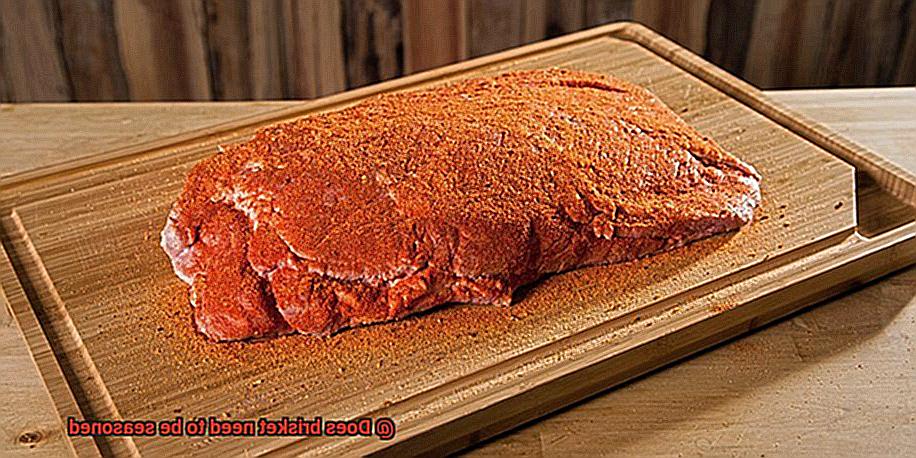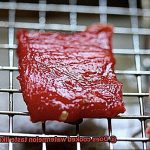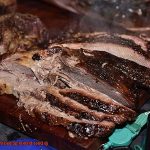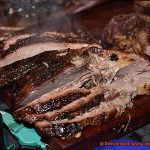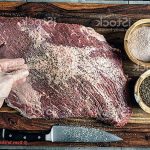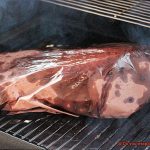As the scent of sizzling meat wafts through the air, the age-old debate about whether or not brisket needs to be seasoned resurfaces once again. Some swear that this cut of meat is flavorful enough on its own, while others insist that a good seasoning is crucial for maximum taste and tenderness. So, what’s the verdict? Does brisket need to be seasoned?
Before we answer that burning question, let’s take a closer look at this beloved Texan dish. Brisket is a tough, fibrous meat taken from the breast of a cow. It’s a staple in many barbeque joints across Texas and beyond, known for its melt-in-your-mouth texture and deep, smoky flavor that can make your taste buds sing with joy.
So why the debate? Some chefs believe that the key to a great brisket lies in allowing the meat to shine on its own. They argue that seasoning can mask the natural richness of the meat, robbing it of its true essence. Others swear by a good rub – one that enhances the flavor profile and helps break down those tough fibers resulting in an even more tender brisket.
In this post, we’ll explore both sides of the argument and provide some tips for seasoning your brisket if you choose to do so. Whether you’re a seasoned pitmaster or just starting out as a backyard barbeque enthusiast, this post is for anyone who’s ever wondered: does brisket need to be seasoned? Let’s dig into this juicy topic and find out.
Contents
What is Brisket?
Brisket is a meat that’s worth exploring, especially if you’re a fan of smoking, grilling, or barbecuing. It comes from the breast or lower chest of a cow and is known for its tough and fibrous texture that requires slow cooking to break down the connective tissue and fat.
The two parts of brisket are the point and the flat. The point is the thicker end of the brisket that contains more fat and flavor, while the flat is leaner and easier to slice with a more uniform texture. You can choose to cook both parts separately or together, depending on your preferences.
When it comes to seasoning your brisket, there are a few options. You can use a dry rub that consists of spices and herbs like brown sugar, paprika, garlic powder, and more. Alternatively, you can opt for a marinade that involves soaking the meat in a flavorful liquid with ingredients like vinegar, soy sauce, Worcestershire sauce, and spices.
Whatever method you choose, seasoning your brisket is crucial to enhancing its flavor. While some argue that brisket has a rich beefy flavor on its own and doesn’t need seasoning, others believe that seasoning takes it to the next level. Brisket can handle a lot of seasoning, so don’t be afraid to use plenty and make sure it’s applied thoroughly.
Do You Need to Season Brisket?
When it comes to cooking brisket, one of the most common questions asked is whether or not it needs to be seasoned. The answer is a resounding yes. Seasoning a brisket involves coating the meat with a blend of spices and herbs to enhance its natural flavor. This not only adds depth to the final dish but also tenderizes the meat by breaking down its fibers.
The type and amount of seasoning can vary based on personal taste and desired flavor profile. While some prefer a simple blend of salt and pepper, others opt for more complex combinations that include garlic, onion powder, and paprika. Rubs and marinades are also game-changers when it comes to flavor. Worcestershire sauce, soy sauce, mustard, and vinegar are all popular ingredients that can take your brisket to new heights.
Without any seasoning, the meat may taste bland and lack depth. Additionally, seasoning helps form a flavorful crust on the exterior of the brisket during cooking, which adds to its overall appeal. But seasoning isn’t limited to just the meat itself. Many recipes call for marinades or rubs that are left on the brisket for several hours or even overnight before cooking.
Benefits of Seasoning Brisket
As an expert on the benefits of seasoning brisket, I can assure you that this is a crucial step in preparing a dish that will leave your taste buds singing with joy.
Let’s explore the many benefits of seasoning brisket in more detail. First and foremost, seasoning helps to tenderize the meat. Brisket is known for its toughness, but by adding a blend of salt, pepper, and other spices, you can break down the fibers in the meat and create a melt-in-your-mouth texture.
In addition to tenderizing the meat, seasoning adds an explosion of flavor that elevates your brisket to the next level. Whether you prefer traditional BBQ rubs or bold and spicy blends, experimenting with different herbs, spices, and rubs can create a unique flavor profile that will tantalize your taste buds.
But we’re not done yet – seasoning also helps to create a highly coveted crust on the outside of the meat known as “the bark.” By seasoning your brisket and cooking it low and slow, you can create a delicious bark packed with flavor and texture that is sure to impress even the most discerning BBQ enthusiasts.
Last but not least, seasoning plays a vital role in keeping your brisket moist during cooking. No one wants a dry cut of meat, and by adding salt and brown sugar to your seasoning blend and wrapping it tightly in foil or butcher paper during cooking, you can lock in moisture and prevent your brisket from drying out.
Dry Rubs for Brisket
There’s nothing quite like the taste of a perfectly seasoned brisket, and dry rubs are the secret ingredient to achieving that mouth-watering flavor. A dry rub is a combination of herbs, spices, and sometimes sugar that is rubbed onto the meat’s surface. Not only does it add flavor, but it also creates a crispy crust on the meat’s surface as it cooks, adding texture to the finished dish.
When it comes to choosing the right dry rub for your brisket, it all boils down to the flavor profile you’re hoping to achieve. If you’re looking for a classic, no-frills brisket, then a traditional Texas-style rub is the way to go. These rubs are salt and pepper-heavy, with a touch of paprika and garlic powder thrown in for good measure. They’re straightforward yet effective, allowing the natural flavor of the meat to shine through while still providing a delicious seasoning.
However, if you’re feeling adventurous and want to experiment with new flavors, there are numerous options available. Some popular ingredients include chili powder, cumin, coriander, mustard powder, or even brown sugar. While these ingredients can add complexity and depth to your brisket’s flavor profile, be sure not to overpower the meat’s natural taste.
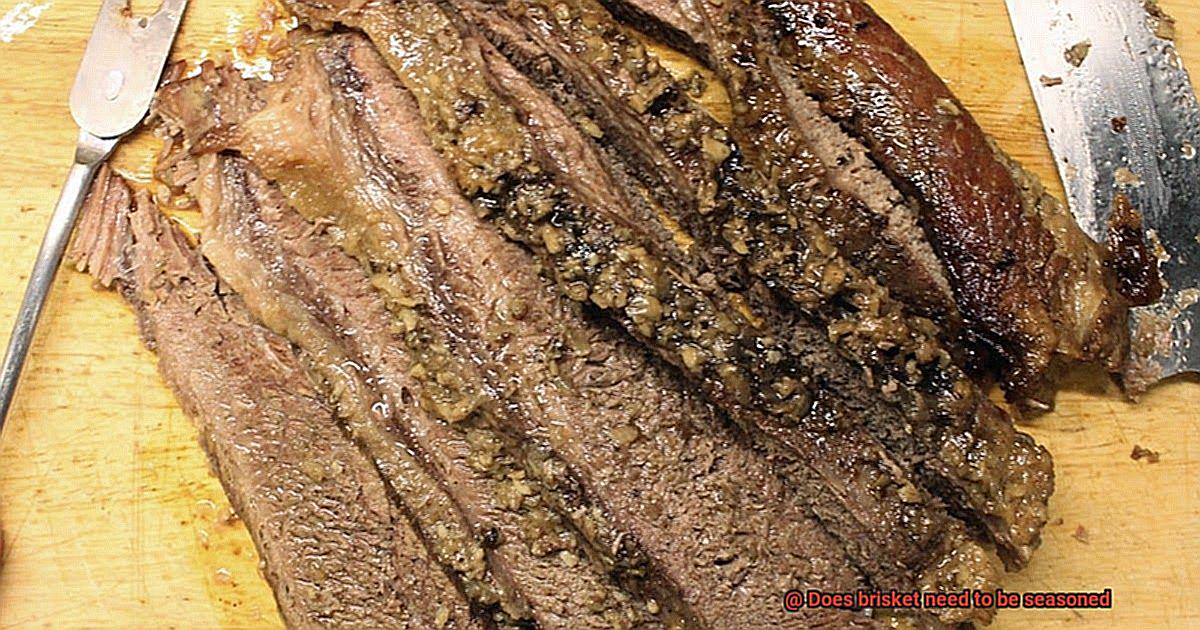
When applying your dry rub, start by patting your brisket dry with paper towels. Then, generously sprinkle the rub all over the surface of the meat and use your hands to massage it in thoroughly. Some people prefer to let their brisket sit with the rub on for several hours or even overnight in the fridge before cooking, while others simply apply it right before cooking.
It’s worth noting that while a dry rub can enhance your brisket’s flavor immensely, it’s not necessary. Brisket can be just as delicious with only salt and pepper or even no seasoning at all. So feel free to experiment and find what works best for you and your taste buds.
Marinades for Brisket
When it comes to seasoning brisket, marinades are a fantastic option that can take your BBQ game to the next level. Marinades are a magical mixture of liquid and seasonings, such as vinegar, citrus juice, soy sauce, Worcestershire sauce, and herbs and spices, that add flavor and tenderize the meat.
One great benefit of using a marinade for brisket is its tenderizing power. The acid in the marinade helps to break down the fibers in the meat, making it more tender and easier to chew. Another advantage is that marinades can add a lot of flavor to the meat. Depending on the ingredients used in the marinade, it can give the brisket a sweet, tangy, spicy, or savory flavor.
Before choosing a marinade for your brisket, it’s essential to consider its compatibility with the beef’s natural flavor. While a sweet and tangy marinade may be perfect for pork or chicken, it might not work as well for beef. Some excellent options for brisket include a classic BBQ sauce, a balsamic vinegar-based marinade, or a spicy chili-lime marinade.
Once you’ve chosen your marinade, it’s important to give it enough time to work its magic. Depending on the recipe, you’ll need to allow anywhere from a few hours to overnight for the meat to absorb all those delicious flavors. Proper storage and handling of the meat during marination are also crucial to avoid any contamination.
How to Generously Season Your Brisket
If you’re looking to impress your guests with a perfectly seasoned and tender brisket, you’ve come to the right place. Here are some tips for how to generously season your brisket before cooking.
Begin with a Flavorful Dry Rub
A dry rub is an excellent way to infuse your brisket with flavor. To create a delicious dry rub, mix together salt, pepper, garlic powder, onion powder, paprika, cumin, and any other desired spices. Generously rub the mixture all over the brisket, ensuring that every inch of the meat is covered. Use your fingers to massage the seasoning into the meat for maximum flavor penetration.
Let it Marinate
Allow your brisket to marinate in the refrigerator for at least a few hours, or overnight if possible. This will allow the flavors to penetrate deeply into the meat and tenderize it. A well-marinated brisket can make all the difference in the final taste and texture of your meat.
Add Some Liquid Love
Consider adding liquid to your brisket before cooking. A marinade or mop sauce can enhance the flavor and help keep the meat moist during the long cooking process. Soy sauce, Worcestershire sauce, vinegar, and various spices and herbs are all excellent additions to your marinade.
Experiment with Different Flavors
Don’t be afraid to experiment with different flavors and spices when seasoning your brisket. Brown sugar, chili powder, and smoked paprika are popular additions that can add depth and complexity to your brisket’s flavor profile.
Generously Apply Your Seasoning or Marinade
Whether you’re using a dry rub or a marinade, it’s important to generously apply your seasoning or marinade. Be sure that every inch of the meat is covered so that the flavors penetrate deeply into the brisket. Your brisket will be bursting with flavor and tenderness.
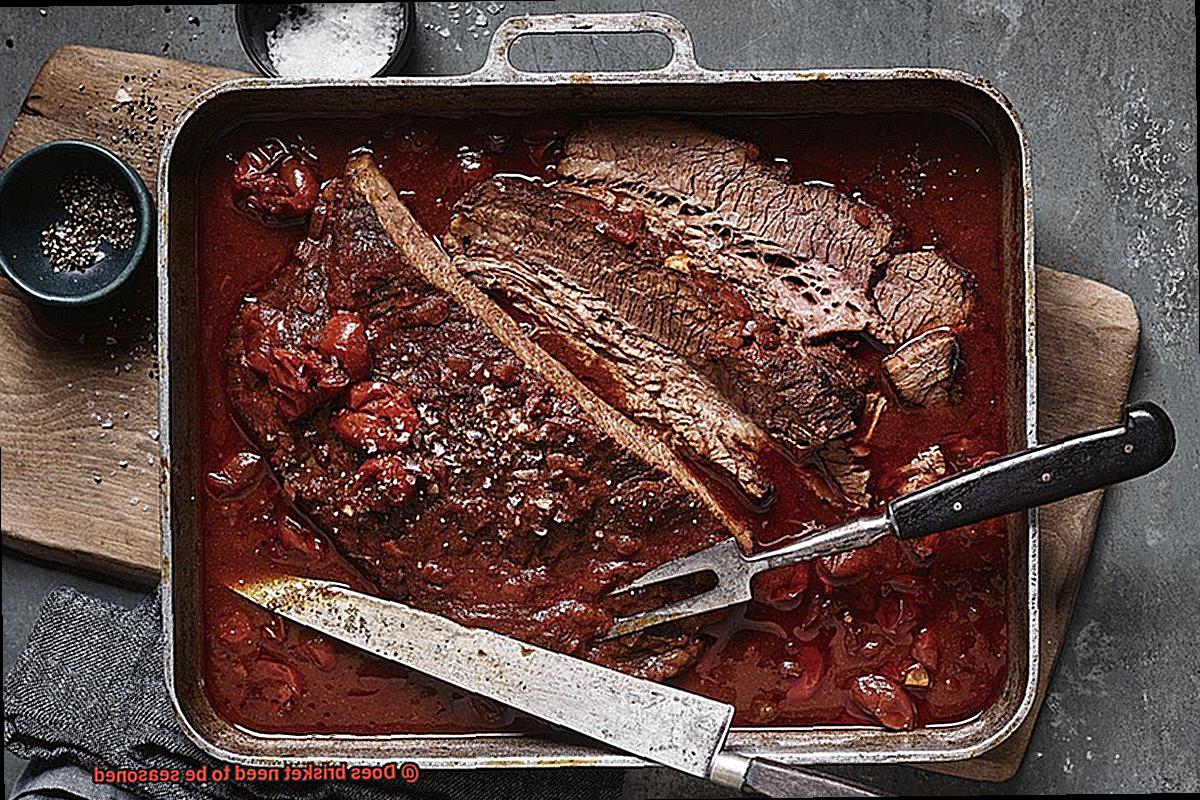
Tips for Perfectly Seasoned Brisket
First and foremost, start with a good quality brisket. A well-marbled cut with a good fat cap ensures that your brisket stays moist and flavorful throughout the cooking process. And let’s be real, who doesn’t love juicy and flavorful meat?
Moving on to seasoning, choosing the right blend is crucial. From dry rubs to marinades to injections, there are several options to explore. Experiment with different blends to find what works best for you and your taste buds. Don’t be afraid to get creative with spices and herbs.
When applying the seasoning, be generous. Use enough to cover the entire brisket evenly and ensure that it penetrates the meat. Don’t forget to generously salt all sides of the brisket before adding any other seasonings. Salt helps enhance the natural flavors of the meat and acts as a tenderizer.
After seasoning your brisket, allow it to rest for at least an hour before cooking. This resting period allows the flavors to penetrate the meat for an even distribution throughout.
Smoking your brisket can add an extra layer of flavor and tenderness. Proper smoking techniques and using wood chips that complement your seasoning blend is essential. A well-smoked brisket can take your taste buds on a journey they won’t forget.
Finally, monitor the cooking temperature to achieve tender and juicy meat. Cooking brisket low and slow is key, aiming for a temperature range between 195-205°F using a meat thermometer.
Don’t forget that tasting as you go is important when seasoning your brisket. Adjust seasonings as needed to achieve your desired flavor profile.
dGyV3EiNfN0″ >
Conclusion
The debate over whether or not to season brisket has been around for ages, with both sides presenting valid arguments. While some chefs believe that seasoning can mask the natural richness of the meat, others swear by a good rub that enhances its flavor profile and helps break down those tough fibers resulting in an even more tender brisket.
- However, one thing is certain – seasoning your brisket is crucial to bringing out its full potential. Not only does it add depth to the final dish, but it also tenderizes the meat by breaking down its fibers. Whether you prefer dry rubs or marinades, the type and amount of seasoning can vary based on personal taste and desired flavor profile.
- When applying your chosen seasoning, don’t be shy – be generous and ensure it penetrates every inch of the meat for maximum flavor penetration. Experiment with different blends to find what works best for you and your taste buds. But don’t forget that proper smoking techniques and monitoring cooking temperature are also essential for achieving tender and juicy meat.
In conclusion, if you want mouth-watering flavor and tenderness in your brisket, seasoning is a must. So go ahead – try out different blends, experiment with marinades, smoke it low and slow, monitor cooking temperature – find what works best for you.

